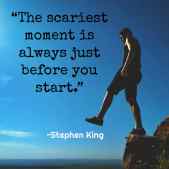Most useful textbook and academic posts of the week: April 5, 2019
 Stephen King once said, “The scariest moment is always just before you start.” In many of our textbook and academic authoring activities, we find the same to be true.
Stephen King once said, “The scariest moment is always just before you start.” In many of our textbook and academic authoring activities, we find the same to be true.
This week’s collection of articles from around the web address some common fears in our industry like low cost textbook alternatives, publisher production values, establishing significance, pursuing research efforts while raising a family, the dark side of academia, and the PhD journey.
With so much to fear, it can be paralyzing, but once we start, we most often find that the scariest moments are behind us and success lies ahead. This week challenge yourself to start something beyond your fears. Happy writing!
Low cost textbook alternatives: Worth the effort?
College textbooks are expensive. In most industries, a more expensive product is also a higher quality one. However, in college textbook publishing this may not be true. In the following case study, an instructor at the University of Utah on the hunt for better materials for an entry-level Arabic language course came to the library looking to create a solution. This article explores the resulting workbook, the collaborative process, and the future of course materials like this one.
Academic publishers and production values
In publishing, “production values” is a term that covers the technical parts of the process. These include such things as: paper quality; page layout and cover design; font types and sizes; proof-reading, copy editing and indexing; print quality – essentially all the different factors that go into making a physical or digital book. A publisher with high production values is one that aims for good quality in these factors; a publisher with low production values is the opposite.
Introductions – establishing significance
Introductions have to do a lot of work in a short space of time. The beginning of the conventional journal article, for instance, has to tell the reader what the paper is about and why it is important. And do that very quickly and persuasively. In a few paragraphs the opening gambit must establish a warrant for the paper – and its significance. It is crucial to establish at the outset that the reader will know something important, good and/or useful by the time they reach the conclusion.
There has been a strong movement over the last ten years to acknowledge the impact that being primary carer has on research careers. Many granting bodies now make allowance for the impact of raising a family, which is wonderful and long overdue. It is a step towards fairness and equality, and it recognises that researchers are people. However, we don’t often talk about people in funding bids.
Academic honesty and the dark side of academia
Academia has a dark side. Some scholars have published work that turns out not to be reproducible, as a result of data fraud or even complete data fabrication. You can read plenty of stories about such dishonesty on Retraction Watch – some are stories about errors in methodology, and researchers jumping too quickly to conclusions, whereas other retraction are the result of fraud. By now, the dark side is present at all levels.
Lessons learned from an African PhD journey
Please note that all content on this site is copyrighted by the Textbook & Academic Authors Association (TAA). Individual articles may be reposted and/or printed in non-commercial publications provided you include the byline (if applicable), the entire article without alterations, and this copyright notice: “© 2026, Textbook & Academic Authors Association (TAA). Originally published on the TAA Blog, Abstract on [Date, Issue, Number].” A copy of the issue in which the article is reprinted, or a link to the blog or online site, should be mailed to Kim Pawlak 1710 Dondee Road, Madison, WI 53716 or emailed to Kim.Pawlak @taaonline.net.

